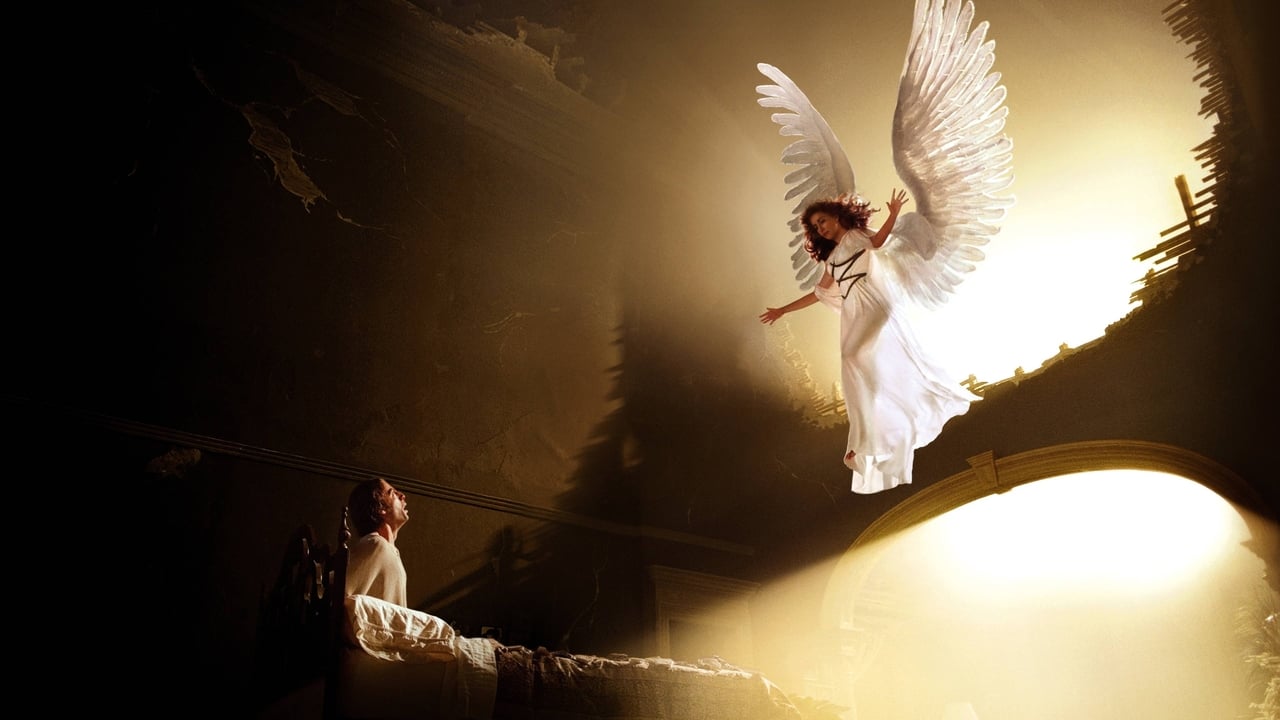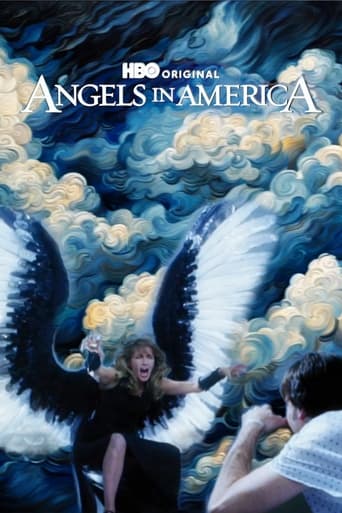

This is long, but generally interesting: good acting and production values.But is it still relevant?. I see that the National Theatre has mounted a production featuring Nathan Lane and former Spiderman Andrew Garfield. Why?The play's treatment of the AIDS story seems dated; the coda mercilessly exposes the sentimentality of the author's "message." Likewise the episodes featuring the wife: boring! You can safely fast forward.Clearly, the author's most intense emotional connections are with the negative characters: with the closeted lawyer and most of all with Roy Cohn, whose political heir is, of course, Donald Trump. Al Pacino's portrayal is over-the-top and un-turn-away-able.The whole angel thing was, for me, a misfire. Though it is spectacular, it ends up sidetracking the drama. The scenes in heaven (conceived with a gay New Yorker's love/hate for San Francisco and filmed in Italy at Hadrian's villa at Tivoli) are anti-climactic, ill-conceived, and badly written. As just one proof, even with the director's help, the poor actor playing Prior can't deliver the lines in a convincing way.
... View MoreHaving read and discussed the script two months ago, it was an eye-opener to see the play performed. Music, sound and visual effects make it come alive. The pace is slow so one can dwell on and think about the characters and themes in more depth. The visual effects are beautiful, though Kushner wanted a more 'rough theatre' – think Brecht, in the stage version – you should be able to see the wires holding up the angels.Roy Cohn played by Al Pacino, was almost too slow. We imagined him to answer the phones more speedily and exhibit more charisma. In the film vision he is less a man of action and more ponderous and clingy.Belize, the male nurse and drag queen appeared to me to be caring but frivolous. The film brings out his intelligent wit.Prior Walker, likewise, comes across as a much deeper person than in the script. He is able to understand, very quickly, what is going on when his doctor updates his prognosis and he comes to terms with it in a sober way and more quickly that Louis.However, we felt that we were not sure what we would have made of it had we not read the script beforehand.
... View MoreTony Kushner's play, Angels in America was on Broadway in the 90's and won the Tony for Best Play twice. One for Perestorika and one for Mellenium Approaches. These 2 parts is what this wonderfully moving and touching film is adapted from.Mike Nichols directs one of his best films with one of the best casts in the past 20 years. The whole cast cared about there roles so much and you could tell they worked incredibly hard with Nichols to try and get as much emotion out of their roles as possible.Justin Kirk really carries this movie with his incredibly beautiful and vulnerable performance. Meryl Streep, Al Pacino, Patrick Wilson, Ben Shenkman, Emma Thompson and the wonderfully effective Mary Louise Parker all deliver what are some of their best performances.This gorgeous film has a fantastic look that keeps your eyes glued to the screen. It was an absolutely beautiful experience. The last scene moved me in ways that I didn't know a movie could. It wonderful, tragic, philosophical and absolutely lovely to watch. 6 hours was not enough.
... View MoreTony Kushner's and Mike Nichols's made-for-HBO adaptation of the former's play is a fabulous overdramatization of the hardened emotional life of disease-ridden American society circa the Reagan/Gorbachev era.What to add to the loud accolade? How to praise an over-praised work when the only thing worth doing is heaping on further praise? I will not recapitulate the story, since a lot of it is straightforward enough. Any wikipedia article will do. Instead, I will try to give a few reasons why this story of AIDS, friendship, power, religion, faith and fantasy is one of the most powerful psychological explorations of human emotional depth to be witnessed in our time.Let me, though, start with my reasons for not giving this story a full 10, but instead minus one.There is a certain overbearing drag to the way the story is carried in the second half, and a certain suspension of belief in some of the many theatrical dream sequences, which carry with them a certain (not entirely unwelcome) "stagy" character to the TV screen. In particular, I shall fault the later dream sequences featuring Emma Thompson as the angel, which feel deprived of the emotional power of the early encounters, mainly due to overacting on Thompson's part (or under-directing on Nichols's part), but also due to a rather cheap theatrical feel which ill fits a box the size of a television. Related to this same point, I think that some of the dramatic effect of the film is puts into shadows by the laconically ever-present, New Yorker's dark humour, more sardonic than salutary (and thus more hurtful than helpful), which cuts through the film like a blunt butter knife through margarine. My last little gripe: the hard-pressed political elements, interwoven in the very fabric of the plot, might strike some people as excessive or even heavy-handed and irrelevant. To accuse this film of being viewpoint-oriented or even myopic, would, however, be to miss the point. Objective presentation of reality this is not. The film is the subjective expression of the subconscious modalities of being gay, forlorn and lost in 80's America. The themes are expressed in symbolism, allegory, subjective (and sometimes shared) dreams and fantasy. The characters' lives interconnect at different intervals and spaces. These points of connection form various "thresholds" and shared dream spaces. It is through these connections, and the losing of these connections, that fate is enacted. By sharing dreams, and dreaming angels, the characters in the saga can find some meaning in the tragic destiny allotted to them by searching after "justice", i.e. chasing and heckling and loving and hating the ever-absent "God" and his ambivalent, meddling and middling army of followers both earthly (Judaism, Christianity, Mormonism) and semi-divine (Angels of Life and Death, nightly visitors, supernatural visions). When we see the love of our life, we see God's love on his or her face, shining back at us. This is grace, this is justice, and this is what angels are for.What, then, are men for? For suffering, for loving each other, for betraying each other and the world.. and for betraying women, their wives, their mothers. And loving God but hating his messengers (both angels and the prophets of fallen humankind). Man may ultimately discover the idea of divinity as a subconscious modality of repressed dream memories and transcendental wishes of world-negation. This is all contained in the story arch of Tony Kushner's screenplay and enacted, with stunning precision and depth, by the wonderful cast in this tour de force of contemporary cinema. How the angelic Al Pacino has been turned into a believable, lovable, pitiable monster is beyond me, but it all makes sense since dreams are made out of bitter, bitter angel dust (and valium, and AZT, and...), and Al Pacino IS, here, for a moment for us to see, the fallen angel Lucifer, the man without a past or a future but a lot of "clout" to bandy about, a sigh in the autumn of his life, an idiot without a tale in someone else's nightmare... which very dream, which very vision, in the end, is unmistakably his own. The dream we dream is the dream of ourselves as Other's creation: as "man", as "angel", as "god", as "me", as "that guy that dreams that dream that contains its own premise".And this is only one character! To say the characters are complex and merciless is to praise their divine humanity, their semi-angelic fallen grace, pitiless and fiery like the burning heart of vengeance.The casting, the music, the lighting, the setting, the script, the plotting, the visuals, the directing and the acting... all of it coheres to make up one hefty heavy-weighter of not only gay, but world cinema. Made for TV or not, some programs are angelically conceived, precisely in their brutal down-to-earth realism. After all, what are American Angels if not down-to-earth messengers of our OWN truth?Thumbs up for HBO and for the cast of this deep and emotional saga for delivering a story that truly livens up the stale landscape of post-millennial TV history, not by being more than or greater than, but being brutally honest about, equal to, and permissive of, the facts of our life's semi-divine emotional drama - making us conversant with love's lasting legacy in pain's angelic visionary embrace.
... View More